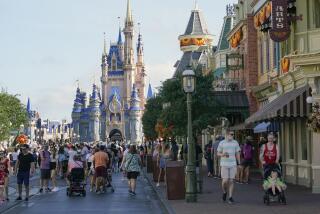Disney Parks Still in the Spotlight : Entertainment: The firm’s movies may be getting a lot of attention, but a plan to expand Disneyland signals where the big money is made.
- Share via
If Walt Disney Co. had to select a mascot for its theme parks, Mickey Mouse or Donald Duck might be passed up in favor of a new character: Cash Cow.
News of a major expansion at Disneyland in Anaheim demonstrates that Disney has not forgotten the most lucrative portion of the Magic Kingdom, and for good reason. The theme parks and resorts--in Anaheim, Orlando, Fla., Tokyo and one under construction near Paris--have generated about two-thirds of operating profits in recent years and will most likely continue to prosper despite growing competition and a potential economic slump.
The theme parks “are all very important parts of the economic engine that runs Disney,” said Nick Winslow, president of Torrance-based Harrison Price Co., a consulting firm. “They are spending some serious money on marketing and big money on new attractions.”
Disney’s reinvigorated movie and consumer product businesses have grown faster than the parks in recent years, and perhaps have received more publicity. But the parks and resorts still accounted for 64% of its $1.2 billion in operating profits in fiscal 1989.
The recent poor showing of some Disney films, most notably “Blaze,” only serves to highlight the importance of the theme park business in the most recent quarter, say analysts.
“What people will focus on is the theme parks,” said David J. Londoner, an analyst who follows the entertainment industry for Wertheim, Schroder & Co. “And the theme parks, I think, will come in just fine.”
The parks are “the mainstay of the company,” agreed Disney spokesman Tom Deegan. “We have not neglected the theme parks, and they have not neglected us.” In fact, the Burbank-based company has poured an estimated $1.5 billion into expanding its parks in the past five years.
Last year, Disney opened its $500-million Disney-MGM Studios Theme Park to capacity crowds as part of its 27,000-acre Walt Disney World in Florida. Walt Disney World will officially add more than 2,000 hotel rooms this year as part of a program that will make Disney the owner and operator of 30 hotels and 26,000 rooms worldwide by 1992.
In Anaheim, Disney has tried to boost stagnant attendance with a series of new attractions--Splash Mountain, Star Tours and Captain Eo--and heavier promotions and advertising. Along with a possible new theme park adjoining Disneyland, the company is also considering a new park that would include the Queen Mary in Long Beach.
Despite the large investments, theme parks are considered huge money makers once they are up and running. Operating costs are relatively stable, and an increase in attendance and ticket prices goes directly to the bottom line, analysts say.
“It’s a veritable cash cow just by the nature of that business,” said analyst Paul C. Marsh of Bateman Eichler, Hill Richards, a Los Angeles brokerage firm. “Once it’s in place, it just a turnstile game.”
The company has raised ticket prices at Disneyland 10 times since 1982--admission was recently raised to $22.50 for an adult--and dropped three-day passes at Disney World in favor of four-day passes priced at $102.45 for an adult and $81.30 for children.
The higher ticket prices, four-day passes and the adjoining hotels are tools that Disney and other amusement park operators have used to squeeze more money out of visitors in the face of stagnant attendance industrywide.
“It’s a mature business that has not been growing rapidly,” said Winslow at Harrison Price. “Most of the growth has come from increased ticket prices and in increasing the amount people spend.”
Analysts play down fears that a possible economic slowdown could hurt Disney’s theme parks.
“I’ve heard stories (that a recession) is going to affect the theme park attendance,” said Jeffrey Logsdon, an analyst at Crowell, Weedon & Co. in Los Angeles. “But in the past, Disney has not even been moderately affected by recessionary times.”
Disney’s strong record in running its theme parks prepares it for increased competition from such well-financed operations as Universal Studios Tour, Six Flags and Sea World.
“Disney is in there with an awfully big base,” said Winslow, “and it’s tough.”
MAIN STORY: A1
More to Read
Inside the business of entertainment
The Wide Shot brings you news, analysis and insights on everything from streaming wars to production — and what it all means for the future.
You may occasionally receive promotional content from the Los Angeles Times.










